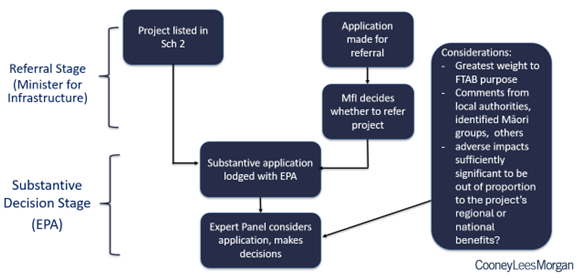Parliament fast tracks new law before Christmas
Partners
Phone: +64 7 927 0590
Email: mhill@clmlaw.co.nz
Bachelor of Arts, Bachelor of Laws (First Class Honours), University of Canterbury
Master of Commercial Law (First Class Honours), University of Auckland
Senior Associate
Phone: +64 7 927 0595
Email: KStubbing@clmlaw.co.nz
LLB / BCom, University of Otago
The Fast-track Approvals Bill (FTAB) passed its third reading yesterday (17 December 2024), taking it one step closer to meeting the Coalition Government’s goal of bringing the FTAB into law before Christmas. At the time of writing it is awaiting Royal Assent which will be the final step, and the Bill will come into force the following day.
This article outlines the main changes since the Select Committee’s report (which you can read about in our article here), and the process fast track applications will follow once the Bill becomes law.
Notably, the proposed system remains a “one stop shop” for RMA consents, and approvals required under other project related legislation such as wildlife and fisheries permits, reserves and conservation concessions, archaeological authorities, marine, mining and minerals permits.
Key changes that have occurred in final stages
An amendment paper proposed by Minister Bishop focussed primarily on drafting improvements, but also contained some key changes including:
- The FTAB now provides a process for prioritising projects on the list, giving the Minister the power to ensure projects are progressed urgently by an Expert Panel (Panel). Before a substantive application is lodged for a listed or referred project, the Minister may determine that the project is a priority project (on application or on the Minister’s own initiative). To qualify as a ‘priority’ the Minister must be satisfied that the project needs to be progressed urgently, including where there is a risk that a panel may not be set up within a period that reflects the urgency of the project.
- The FTAB includes a new provision that prevents referral applications (to the Minister) and substantive applications (for projects on the list) from being lodged before 7 February 2025.
- The provisions controlling timing of panel decisions have changed, with Panels now having some discretion around setting decision timeframes. The FTAB states that a Panel must issue its decision within 30 working days (of receiving comments from parties), or by a date that the Panel considers appropriate having regard to the scale, nature, and complexity of the approvals sought.
- The full list of 149 projects is now included in Schedule 2 of the Bill. It can be found here. The Schedule includes an authorised person, project name, project description and approximate geographical location for each project.
- There have also been changes to the limited grounds on which a Panel may decline approval for a project. Under the Bill as proposed to be amended by the Select Committee, the Panel had the power to decline approval where “adverse impacts are sufficiently significant to outweigh the purpose of the bill”. This has been reframed slightly, with the latest version of the Bill proposing that the panel may decline approval where “adverse impacts are sufficiently significant to be out of proportion to the project’s regional or national benefits”.
Process
This diagram provides a high level overview of the progress of an application under the FTAB:
Referral Stage
Similar to the previous Covid-19 fast track legislation, there are two ways that a project can access the fast-track process; as a listed project, or a referred project.
Listed projects are those set out in Schedule 2 of the Bill. These will go straight to a Panel following lodgement of a substantive application and when accepted as complete by the Environmental Protection Agency (EPA).
The referred projects pathway allows any person or organisation to apply to have their project fast-tracked by the Minister for Infrastructure. Prior to making a referral application, consultation by an applicant must be undertaken with local authorities, identified Māori groups, and administering agencies (for example, the Department of Conservation if a concession application is required).
The Minister will assess the application for referral against criteria in the FTAB, including the purpose of the Bill and whether the fast-track will result in a more expedient and cost efficient process for the project. The FTAB also contains a list of eligibility criteria, with an application for referral required to demonstrate (among other things) a regional, national, or economic benefit, that housing supply will be increased, that the development of natural resources (including minerals and petroleum) will be supported, and / or that climate change mitigation, including the reduction or removal of greenhouse gas emissions, will be supported.
Substantive Decision Stage
The next step in the process is the substantive decision stage. Before lodging the substantive application, projects in Schedule 2 require consultation in the same way as for referral applications. After this, both listed and referred projects follow the same substantive decision process.
Substantive applications must first be submitted for approval by the EPA. The EPA assesses the application against criteria for acceptance (contained in a schedule for each piece of legislation under which approvals are being sought), whether the application is complete and whether it is within scope (that it does not contain any new or ineligible activities, for example). If an application is assessed as complete and within scope, it is then sent to a Panel for consideration.
While the FTAB provides that comments may be invited from any other party the Panel considers appropriate, the rights for interested parties to be involved are more limited than previous fast track legislation. Comments must be invited from owners and occupiers of land to which the application relates and adjacent land, but this right does not extend further to other potentially affected properties.
For an application for resource consent, the Panel must still assess the proposal against the usual RMA criteria (including plans, policies, the RMA’s purpose, and sections 6, 7, and 8) but there is discretion as to the weight to give the criteria. The Panel is required to prioritise the purpose of the Bill over the purposes and provisions of other Acts, including that of the RMA; being directed to give ‘the greatest weight’ to the Bill’s purpose.
The Panel has the power to hold a hearing if considered necessary, but is not required to. The Panel may also suspend processing of the application and can request further information or a report, in limited circumstances. The Panel makes the ultimate decision to decline or approve a proposal, including what conditions to impose.
Appeals of the Panel’s decision are limited to points of law. While judicial review is also available, a challenge by way of judicial review must be filed no later than 20 working days after notice of a decision on a referral application or substantive decision (or within any further time allowed by a High Court if sought prior to the expiry of that period).
Final comments
Significant opposition to the FTAB was maintained during its final stages through Parliament. There are a number of new concepts in this legislation that will no doubt be tested through some of the first projects assessed under the new Act.
Applicants will be required to pay an initial application fee and levy to the EPA when lodging a referral or substantive application. Those fees will be set out in regulations.
Last week MfE released some application documentation on its website relating to the 149 projects that are included in Schedule 2. The Ministry has indicated that documents for the other applications (received between 3 April and 3 May 2024) will be released in late December.
You can read the Bill here. If you have any questions about the fast track approvals process, feel free to get in touch with a member of our Resource Management Team.
Special thanks to our summer clerk, Vanessa Williams, for assistance with this article.
Latest Update: 18 December 2024







